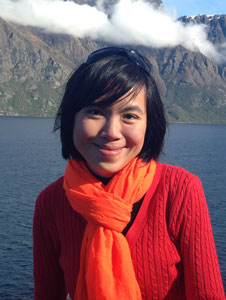 Friday 9 June 2017 12:27pm
Friday 9 June 2017 12:27pm
Dr Trang Khieu
New research from the University of Otago, Wellington, shows that influenza kills about 500 New Zealanders each year, and the risk of premature death is much higher for Māori, Pasifika, men and those living in relative poverty.
The research published this week in the Journal of Infection, is based on work by Dr Trang Khieu as part of her PhD at the University of Otago, Wellington.
“Our research shows that influenza is probably New Zealand's biggest single infectious disease killer, accounting for about 1.8 per cent of total deaths in NZ,” says Dr Khieu.
This research has also, for the first time in any country, estimated the distribution of flu deaths in relation to ethnicity and social deprivation (as well as gender and age group which have been looked at in previous studies).
The study was based on a 15 year period (from 1994 to 2008) prior to the last influenza pandemic (2009-2010). This kind of modelling needs multiple years of data to produce good estimates of flu deaths, partly because the severity of the influenza season varies so much from year to year.
“Future work will update these estimates for the post-pandemic period, but we would expect the findings to be broadly similar,” says Dr Khieu.

Professor Michael Baker
The study showed that the inequalities in influenza deaths are striking:
- In the key 65-79 year age group, Māori are 3.6 times more likely to die of influenza than those of European/other ethnicity. And Pacific People are 2.4 times more likely to die compared with European/others during a typical flu season.
- Those living in the most deprived 20 per cent of neighbourhoods are almost twice (1.8 times) as likely to die of influenza compared with those living in the least deprived areas.
- Men are also more vulnerable, with males aged 65-79 years almost two times (1.9 times) more likely to die of influenza than females.
“These results show that it is important to target flu vaccination and other interventions to the most vulnerable groups, in particular Māori and Pacific people and men aged 65-79 years and those living in the most deprived areas,” says study co-author Professor Michael Baker, from the University of Otago, Wellington.
“Having an annual influenza vaccination is still the best protection we have. It is also free of charge for everyone 65 years and over,” Professor Baker says.
The study used modelling (a series of quasi Poisson regression models) to estimate influenza deaths in each population group. This approach is necessary because only a small proportion (about one in 23 in New Zealand) of influenza deaths is recognised, confirmed and recorded on death certificates. This modelling shows that the largest numbers of flu deaths (37 per cent) are circulatory conditions such as heart attacks and strokes. In most instances, flu will not even be suspected as the cause, particularly in cases of sudden death.
The crude influenza mortality rate found in this study was 13.5 per 100,000 for all causes. This rate is similar to those estimated for other high income countries, though none have reported the distribution of influenza mortality risk by ethnicity and socioeconomic position.
All of these studies show that increasing age is the single most important risk factor for influenza mortality. In New Zealand, 86 per cent of deaths occurred in those 65 years of age and over, a rate of 90.3 per 100,000.
“This research illustrates how the borderline between infectious diseases and non-communicable diseases, such as heart disease and cancer, is not particularly firm. Infectious diseases like influenza can precipitate sometimes fatal events such as heart attacks, and chronic conditions such as cardiovascular disease make us more vulnerable to infections,” says Professor Baker
For further information, please contact:
Professor Michael Baker
Department of Public Health
University of Otago, Wellington
Tel: 04 918 6802
Email: michael.baker@otago.ac.nz
A list of Otago experts available for media comment is available elsewhere on this website.
Electronic addresses (including email accounts, instant messaging services, or telephone accounts) published on this page are for the sole purpose of contact with the individuals concerned, in their capacity as officers, employees or students of the University of Otago, or their respective organisation. Publication of any such electronic address is not to be taken as consent to receive unsolicited commercial electronic messages by the address holder.